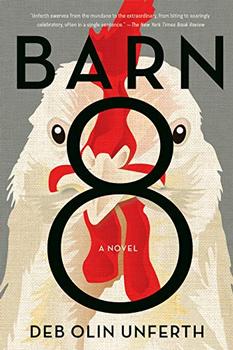Summary | Excerpt | Reviews | Beyond the Book | Readalikes | Genres & Themes | Author Bio

But he never asked her to leave. Soon she was reading the TV Guide (which arrived in paper each week) and watching whatever went up on the screen. He worked as a something something for the USDA at a poultry processing plant, which meant he spent his days inspecting dead bodies. She slept until noon in the room he "set up" for her—blow- up mattress on the floor—and then she prowled the apartment until he came home. She went through the closets, the drawers, the sticky cupboards, looking for what? Evidence. Not only of his failure as a father but as a person, of which there was plenty: his enormous saggy shirts, his rusty nail clippers, his bent shoes, expired cans of soup, not a book in the place, not a photo on the wall. Each day at 4:50 p.m. he turned up at the apartment, stinking of offal and carrying a bag from the same cheap IHOP restaurant filled with the same items off the menu for them both. He kept plastic gallon milk containers full of water in the refrigerator and drank from one while he ate.
Her mother left daily messages. Should Janey be skipping school like this? Did Janey know her Malcolm X paper was due? Did Janey recall the regional debate was next week, after all her hard work and her debate coach was ... Well, she'd missed the end of school, was she proud of herself?
She watched him stooped over the sink or lifting plastic plates out of cupboards with shaky fingers. She wondered what her mother had seen in this guy. And then she stopped wondering because obviously her mother had seen nothing and that's why she left and why Janey had been kept away from him all these years. The old Janey had, if memory serves, rarely fought with an adult, but the new Janey had a mouth on her and said what she could to gall her father, or hurt him, or get any word out of him at all. The new Janey and the truant father had some spectacular fights. Once she barricaded the door. Once she threw his clothes out the window and onto the parking lot where they looked like globs of color on the hot blacktop until he eventually went down and gathered them, stabbing them up with a long cooking fork and dropping them into a bag like the convicted doing their service.
Oh why had she left home? Surely it was excusable—a girl wants to meet her father, right? People quest. People roam.
She could see her other self, her imaginary twin, the old Janey, skipping down the stairs to the street, high-fiving the janitor on the way (this was an elaborated detail, since she'd rarely spoken to the janitor, but her coastal self was beginning to seem cooler and kinder than the actual Janey had ever been).
Her mother's messages became longer. She talked about growing up in that small Iowan town, how her own father had come to the US as a teen, worked ag, become a citizen, and embarked on a (mostly failed) mission to unionize farmworkers in different parts of the country. He'd leave for months, return for a few weeks, and again leave, until one day he didn't come back. Her mother worked ag admin, spoke English, raised her daughter to never love a wandering man. But Janey's mother turned out to be the wanderer, a woman with her mother's tongue, her father's heart and name. Four months pregnant, nearly nineteen, she'd packed her suitcase and trained it alone to New York. She'd buy Janey a plane ticket whenever Janey was ready. She'd fly out herself and pick her up. She wasn't going to force her, didn't want to push her, but she loved Janey and missed her and was sorry ...
It was July now and the mosquitoes had gotten so bad, the air so moist, Janey barely left the apartment. The claustrophobia was making her and her father yet crazier. She was so lonely, she thought she could hear her mother calling to her. Was it her fault she'd slept with this clod? her mother seemed to be saying. At least she'd gotten Janey in the bargain.
One night, her father hadn't said a word in hours and Janey thought she'd explode. She came out of the kitchen, cupped her hands, yelled, "Anybody home?"
Excerpt from Barn 8. Copyright © 2020 by Deb Olin Unferth. Used with the permission of Graywolf Press, Minneapolis, Minnesota, www.graywolfpress.org.
Your guide toexceptional books
BookBrowse seeks out and recommends the best in contemporary fiction and nonfiction—books that not only engage and entertain but also deepen our understanding of ourselves and the world around us.